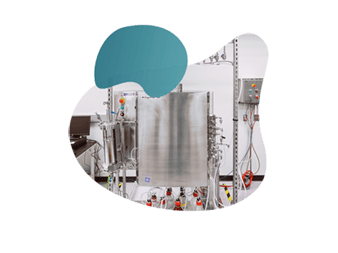Originally published : Wed, October 2, 2024 @ 6:17 PM
In our latest ‘Know your oligo mod’ post, we look at the impact of 5-methyl deoxycytidine – a modified nucleoside that increases the stability of the duplex and lowers the immune response to therapeutic oligos.
Overview of the 5-methyl deoxycytidine modification
5-methyl deoxycytidine (also referred to as 5-methyl deoxycytosine, 5-MedC or 5mdC) is a popular substitution for cytosine when designing custom oligonucleotides.
5-MedC is a methylated cytosine base with the methyl group on the fifth carbon of the pyrimidine ring. This slight change can have a significant impact on oligo characteristics, making it a popular modification for a range of purposes.
The hydrophobic nature of the methyl group helps to exclude water molecules when the oligo forms a duplex with its target.
This greater hybridisation efficiency offers several significant advantages:
- Raises the Tm slightly by 1.3 °C per 5-MedC substitution.
- Enables the use of shorter oligos, resulting in better quenching in probes.
- Helps to overcome secondary structure in the target that would otherwise block annealing.
- Enhances sensitivity of primers in qPCR assays, particularly with palindromic sequences.1
Benefits of 5-MedC modification in therapeutic oligos
5-MedC modifications have been used extensively in the development of therapeutic oligos. By introducing greater binding specificity, 5-MedC can potentially reduce the likelihood of a candidate therapeutic having off-target effects. Unintended interactions that interfere with important biochemical pathways can be a key determinant in whether a potential drug has a tolerable side effect profile.
More importantly, 5-methyl deoxycytidine can prevent or reduce the in vivo immune response to some oligos, leading to particular interest in its use.
CpG motifs, an unmethylated cytosine followed by a guanine, are commonly found in microbial genomes. This means that our immune system uses CpG motifs as a marker for responding to infection. When CpG motifs are present in antisense oligonucleotides (ASOs), it can trigger pro-inflammatory immune responses, creating a hurdle for developing safe therapeutics.
 Henry et al. showed that 5-MedC modified oligos reduced immune stimulation in mice.2 This was later found to be due to antagonist activity of toll-like receptors 7 and 9.3
Henry et al. showed that 5-MedC modified oligos reduced immune stimulation in mice.2 This was later found to be due to antagonist activity of toll-like receptors 7 and 9.3
This discovery soon led to clinical applications and 5-MedC was used in mipomersen (Kynamro®), which was approved in 2013 to become the second-ever ASO to come on the market. Since then, 5-methyl deoxycytidine has been used in several successful ASOs, including the spinal muscular atrophy drug nusinersen (Spinraza®).
5-MedC plays a vital role in epigenetic regulation
In molecular biology studies, 5-methylcytosine (m5C or 5-mC) is an abundant epigenetic DNA modification, playing a particular role in regulating promoter regions to prevent gene expression. It is important for several biological processes, and alterations have been linked to cancer development.4
There are now several qPCR assays developed as in vitro diagnostic tests for methylation biomarkers in various types of cancer.5 These biomarkers can be used for diagnosis, disease management and post-treatment monitoring.
Several research projects have used oligos containing 5-MedC to probe the mechanisms involved in DNA methylation and its impact on health.6,7
Researchers have also examined methylated oligonucleotides containing 5-MedC as potential therapeutics that induce epigenetic changes. Yao et al. showed that their methylated oligo could trigger methylation at the promotor for the IGF2 gene, a key target in a range of cancers.8
Order probes, primers and custom oligos incorporating 5-MedC
5-methyl deoxycytidine has a wide range of uses and has proven its value in its incorporation in several successful therapeutic oligos. With its benefits in improved duplex formation, reduced immune response and ability to manipulate epigenetic modifications, 5-MedC modifications will continue to be in strong demand for custom oligos. LGC Biosearch Technologies offers 5-methyl deoxycytidine internally or at the 5ʹ terminus of an oligonucleotide.
Know your oligo mod series
- 5-Nitroindole – a universal base oligo modification
- BHQ® (Black Hole Quencher®) non-fluorescent quenchers
- Thio C6 linker
- 3' Spacer C3
- Phosphorothioate bonds
- 2'-O-methoxyethyl (2'-MOE)
References
- Lebedev Y et al. (1996) Oligonucleotides containing 2-aminoadenine and 5-methylcytosine are more effective as primers for PCR amplification than their nonmodified counterparts. Genetic Analysis - Biomolecular Engineering. 13: 15-21. doi:10.1016/1050-3862(96)00139-8
- Henry S et al. (2000) Chemically modified oligonucleotides exhibit decreased immune stimulation in mice. J Pharmacol Exp Ther 292(2):468–479. https://jpet.aspetjournals.org/content/292/2/468
- Yu D et al. (2009) Modifications incorporated in CpG motifs of oligodeoxynucleotides lead to antagonist activity of toll-like receptors 7 and 9. J Med Chem 52(16):5108–5114. doi:10.1021/jm900730r
- Gao Y and Fang J (2021) RNA 5-methylcytosine modification and its emerging role as an epitranscriptomic mark. RNA Biol. 18(Suppl 1): 117–127. doi: 10.1080/15476286.2021.1950993
- Taryma-Leśniak O et al. (2020) Current status of development of methylation biomarkers for in vitro diagnostic IVD applications Clinical Epigenetics 12: 100. doi:10.1186/s13148-020-00886-6
- Mancini DN et al. (1999) Site-specific DNA methylation in the neurofibromatosis (NF1) promoter interferes with binding of CREB and SP1 transcription factors. Oncogene. 18: 4108-4119. doi:10.1038/sj.onc.1202764
- Zhang H et al. (2007) Maternal cocaine administration causes an epigenetic modification of protein kinase Cepsilon gene expression in fetal rat heart. Mol. Pharmacol. 71: 1319-1328. doi: 10.1124/mol.106.032011
- Yao X et al. (2003) A methylated oligonucleotide inhibits IGF2 expression and enhances survival in a model of hepatocellular carcinoma. J Clin Invest. 2003 Jan 15; 111(2): 265–273. doi: 10.1172/JCI15109


